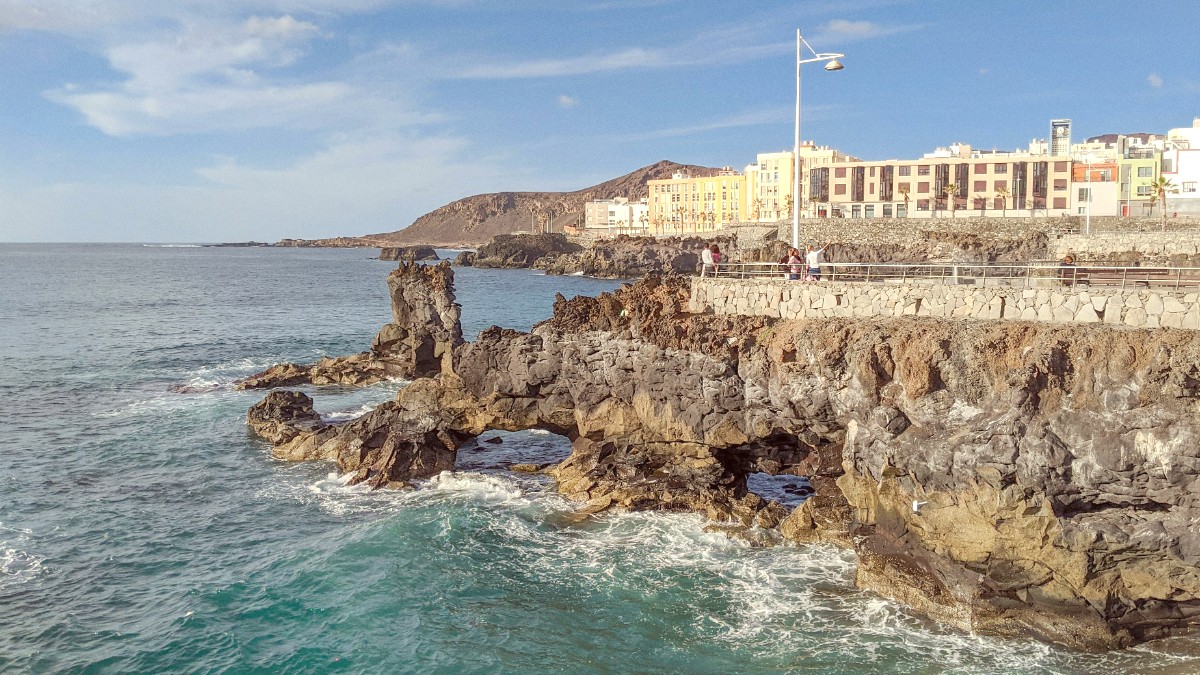
Gran Canaria, Canary Islands
Las Palmas de Gran Canaria is a subtropical desert climate, described as having "eternal spring" temperatures. This climate means mild, pleasant weather throughout the year, making it a destination suitable for visits any month. Still, knowing the distinctions of its climate and travel seasons helps pick the best time for your interests.
Average daily temperatures range from a comfortable 19°C (66°F) in winter to a warm 26°C (79°F) in summer. Coastal areas, like Las Palmas, benefit from cooling from the Atlantic Ocean and consistent trade winds. This moderates the heat, preventing extreme temperatures common in other desert climates. Rainfall is minimal. It mainly falls between October and March. Summers are typically dry. Las Palmas has around 150-200 mm (6-8 inches) of rain annually. This means many sunny days, even in the "rainier" months. When it rains, it often comes as short, light showers, clearing quickly.
For beach and water sports, visit from May to October for the warmest sea temperatures. Surfing is a year-round activity, though a Wetsuit is often welcome outside peak summer months. For hiking and outdoor activities, plan trips between October and May. Temperatures are cooler and more comfortable for strenuous activity in the island's interior. If Carnival is a priority, plan your visit for February or March (dates vary). The city becomes very crowded, and accommodation rates surge. Book well in advance. Christmas/New Year is a popular winter escape, with good weather for relaxation and festivities.
Consider a visit during the shoulder season (March to May or September to November) for an excellent balance of good weather, fewer crowds, and better prices.
Spain is part of the Schengen Area.
Citizens from US, Canada, UK, Australia, NZ, Japan, South Korea, most South American countries do not need a Schengen visa for stays up to 90 days. Always verify your country's status.
Starting mid-2025 (estimated), visa-exempt non-EU citizens will need ETIAS authorization. This is a pre-travel authorization, not a visa.
For stays up to 90 days (non-EU/EFTA citizens).
Apply through the Spanish embassy or consulate in your country. Start well in advance.
Passport (valid 3 months beyond departure, issued within 10 years, 2 blank pages), Return ticket, Accommodation proof, Sufficient funds proof, Travel Insurance (€30,000 medical coverage).
No general entry fees. Standard passport control.
Non-EU/EFTA citizens get passport stamped. E-gates for certain nationalities. Standard questions about visit purpose and duration.
No special permits for general tourism. Some specific hiking routes in protected natural parks may registration.
The currency throughout Spain is the Euro (€). ATMs are widely available for Euro withdrawals. Credit and debit cards (Visa, Mastercard) are widely accepted. Advise your bank of travel plans to avoid card freezing. Always choose to be charged in Euros at ATMs or for purchases; this avoids dynamic currency conversion (DCC), which can be at an unfavorable rate.
Tipping in Spain is not as ingrained as in some other countries, but it is appreciated for good service. In restaurants, rounding up the bill or leaving 5-10% for good service is common, especially in more formal settings. No additional tip is needed if a service charge is included. For taxis, round up to the nearest euro or add €1-€2 for longer rides or luggage help. Small tips for hotel porters (€1-€2 per bag) or housekeepers (€2-€5 per night at stay's end) are welcome. For bars/cafes, a tip for a single drink is not customary, but loose change for famous service is fine.
€50-€80 (hostel, self-catering/cheap tapas, bus/walking, free activities).
€80-€150 (3-star hotel, sit-down meals, public transport/occasional taxi, tours).
€150+ (4-5 star hotel, fine dining, private transfers/taxis, exclusive experiences).
Hostel dorm: €20-€35 | Budget Hotel: €40-€70 | Mid-range: €70-€120 | Luxury: €120-€300+.
Coffee: €1.50-€2.50 | Tapas: €3-€7 | Menu del Día: €10-€18 | Mid-range meal: €12-€25.
Your well-being during your trip to Las Palmas de Gran Canaria is a priority. This section outlines health and safety information for a worry-free visit.
No specific vaccinations are required for entry to Spain. Keep routine vaccinations up to date: MMR, Diphtheria-Tetanus-Pertussis, Varicella, Polio, and annual flu shot. Hepatitis A and B are sometimes recommended for longer stays or street food consumption. Consult a healthcare professional.
Call 112 for all emergencies (ambulance, police, fire). Las Palmas has excellent public and private healthcare facilities. Hospitals include Hospital Universitario Insular de Gran Canaria and Hospital Universitario de Gran Canaria Doctor Negrín. Pharmacies (Farmacia, green cross sign) are widely available and offer advice for minor ailments. Many operate 24-hour service (de guardia signs).
For visa application services, consider using reputable online platforms for assistance with your visa process.